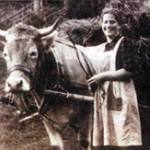![Aus dem Filmmaterial der Time and Motion Studies von Lillian und Frank Gilbreth, Quelle: Prelinger Archives, aus: https://www.univie.ac.at/fernetzt/time-and-motion-studies-die-vermessung-von-arbeit/ [Zum Vergrößern anklicken] adamski_TimeandMotion-filmstill-300x169](https://salon21.univie.ac.at/wp-content/uploads/adamski_TimeandMotion-filmstill-300x169-150x150.png) fernetzt. Verein zur Förderung junger Forschung zur Frauen- und Geschlechtergeschichte (Web)
fernetzt. Verein zur Förderung junger Forschung zur Frauen- und Geschlechtergeschichte (Web)
Mit fernetzt – der Blog wurde im November 2015 eine interdisziplinäre Plattform für die Förderung des wissenschaftlichen Austausches und der Vernetzung junger Forscher*innen im Bereich der Frauen- und Geschlechtergeschichte online geschalten. Der Anspruch des Blogs ist es, Impulse für Diskussionen zu setzen und die Sichtbarkeit junger Forschung zu erhöhen.
Die Autor*innen berichten zu unterschiedlichen Themen, aus der Forschungswerkstatt und dem Forschungsalltag, diskutieren Quellen, schildern Eindrücke von Konferenzen oder setzen sich kritisch mit aktuellen gesellschaftlichen oder (geschichts-)wissenschaftlichen Theorien, Debatten und Ereignissen auseinander.
Bisher wurden die Posts veröffentlicht (Web):
- Von der “Wirtin des weißen Rößls” zum “Owner of the Dark Horse Inn”; von Susanne Korbel
- Time and Motion Studies: Die Vermessung von Arbeit; von Theresa Adamski
- „… the need to redefine and rethink…“ – Die Historikerin Gerda Lerner und der Sprachdenker Karl Kraus; von Katharina Prager
- Eurovision Cold War. Geopolitics and Queerness at the Eurovision Song Contest in 2007; von Michaela Maria Hintermayr
- „So wie ihr euch draußen im Felde hervorgetan, so sollt ihr auch jetzt eueren Mann stellen”; von Thomas Rohringer


![via http://journals.berghahnbooks.com/girlhood-studies/ [Zum Vergrößern anklicken] jnl_cover_ghs](https://salon21.univie.ac.at/wp-content/uploads/jnl_cover_ghs-150x150.gif)
![via Einladung [Zum Vergrößern anklicken] Festsymposium_Mitchell_Ash-1-1](https://salon21.univie.ac.at/wp-content/uploads/Festsymposium_Mitchell_Ash-1-1-150x150.jpg)
![Logo via Aussendung [Zum Vergrößern anklicken] Teilstück 1.2.2](https://salon21.univie.ac.at/wp-content/uploads/Teilstück-1.2.2-150x70.jpg)
![via: http://blog.feministische-studien.de/2016/06/more-love-less-hate/ [Zum Vergrößern anklicken] IMG_0404](https://salon21.univie.ac.at/wp-content/uploads/IMG_0404-150x150.jpeg)
![Kriegsgefangenenpostkarte von Georg M., 22. Juli 1916 [Zum Vergrößern anklicken] 1916 07 22](https://salon21.univie.ac.at/wp-content/uploads/1916-07-221-150x150.jpg)
